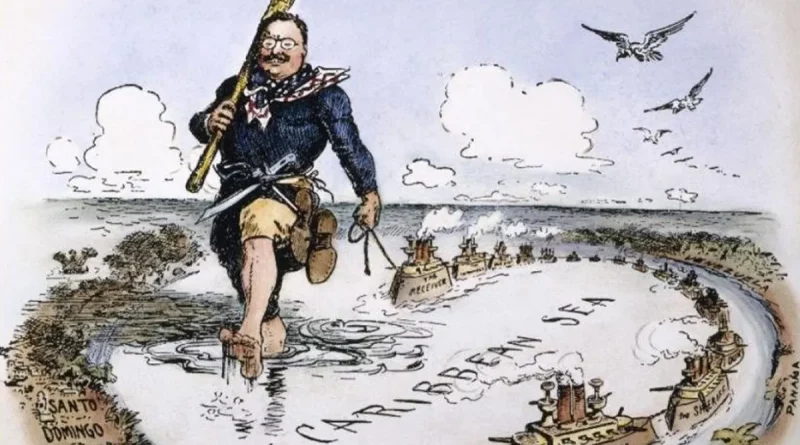Por Katherine Hoyt.
Katherine Hoyt fue Coordinadora Nacional de la Red Nicaragua y la Alianza por la Justicia Global durante muchos años antes de su jubilación. Ahora forma parte de la junta directiva de la Alianza por la Justicia Global.
En el bicentenario del anuncio de la Doctrina Monroe ante el Congreso de Estados Unidos, la Representante Nydia Velásquez (Demócrata por Nueva York) presentó una Resolución en la Cámara de Representantes demandando la anulación de esta infame Doctrina.
La Representante Velásquez afirmó, esta Doctrina ha sido utilizada para justificar la intervención de Estados Unidos en los asuntos latinoamericanos a lo largo de la historia de dicha política. Emitida por el presidente James Monroe el 2 de diciembre de 1823, la Doctrina establece que cualquier interferencia en las Américas por parte de una potencia europea sería vista por Estados Unidos como un acto hostil. En 1904, el presidente Theodore Roosevelt añadió el Corolario Roosevelt, que establece Estados Unidos puede involucrarse en los asuntos internos de un país latinoamericano cuando considerase existía “comportamiento indebido” en ese país.
- También puedes leer: El héroe de la humanidad Julián Assange
La Resolución No. 943 de la Cámara de Representantes es copatrocinada por los Representantes Alexandria Ocasio-Cortez (D-NY), Jesús Chuy García (D-IL), Delia Ramírez (D-IL) y Greg Casar (D-TX), identificados con el “ala progresista” del Partido Demócrata.
El representante Casar dijo en el Comunicado de Prensa que anunciaba la Resolución: “La política exterior de Estados Unidos con demasiada frecuencia ha contribuido a la inestabilidad en América Latina. En lugar de derrocar gobiernos debidamente electos, podemos apoyar la democracia, hacer crecer nuestras economías y reducir la migración forzada. En lugar de sanciones que maten de hambre a nuestros vecinos, podemos trabajar juntos para resolver la crisis climática. Podemos comenzar a trazar este nuevo camino hacia adelante eliminando la obsoleta Doctrina Monroe”.
En una serie de “Considerandos”, la Resolución esboza la historia de la intervención estadounidense en América Latina, desde la anexión de Texas y más de la mitad del territorio mexicano en la década de 1840, hasta el golpe de derecha de 2019 en Bolivia. El párrafo más largo cubre el período de la década de 1980, cuando Estados Unidos financió el genocidio en Guatemala; los escuadrones paramilitares de la muerte en El Salvador y los violentos contras que intentaban derrocar al gobierno revolucionario sandinista de Nicaragua.
La Resolución luego dice: “resuelve que la Cámara de Representantes considera… el Departamento de Estado debe confirmar formalmente que la Doctrina Monroe ya no es parte de la política de Estados Unidos hacia América Latina y el Caribe; [y] en lugar de la Doctrina Monroe, el Gobierno Federal debe desarrollar una “Nueva Política de Buen Vecino”, diseñada para fomentar mejores relaciones y profundizar una cooperación más efectiva con todos los países del hemisferio”. Exige un nuevo enfoque para promover el desarrollo basado en el respeto por la integridad de los planes soberanos de desarrollo económico de los gobiernos de la región, tomando en cuenta Estados Unidos ha apoyado muchos golpes de estado en América Latina y el Caribe porque los líderes estadounidenses consideraban que los planes de desarrollo de un país eran “socialistas” o de alguna manera ofensivos para el gobierno estadounidense de turno.
- Te recomendamos leer: Darío y su credo político
Asimismo, la Resolución orienta “poner fin a todas las sanciones económicas unilaterales impuestas mediante Ordenes Ejecutivas y trabajar con el Congreso para eliminar todas las sanciones unilaterales impuestas por ley, como el embargo a Cuba”.
Estados Unidos ha impuesto sanciones a muchos países de todo el mundo y las medidas planteadas en esta Resolución acabarían con las sanciones impuestas por el presidente y le daría el mandato de trabajar para eliminar las que resulten de leyes aprobadas por el Congreso, como la infame Ley NICA que ha impedido que Nicaragua reciba préstamos de instituciones financieras internacionales.
Otra medida exige “proceder a la pronta desclasificación de todos los archivos del Gobierno de Estados Unidos relacionados con pasados golpes de Estado, dictaduras y períodos en la historia de los países de América Latina y el Caribe que se caracterizan por alta tasa de crímenes contra los derechos humanos perpetrados por las fuerzas de seguridad”.
Esta desclasificación permitiría conocer más detalles sobre el apoyo de Estados Unidos a golpes e intentos de golpe en el pasado distante, así como otros más recientes, como los golpes que derrocaron al presidente hondureño Manuel Zelaya en 2009 y al presidente boliviano Evo Morales en 2019, así como el intento de golpe de Estado en 2018 contra el presidente Daniel Ortega en Nicaragua.
- Te puede interesar: Yemen. En el Mar Rojo, ataque a los hutíes yemeníes
Asimismo, la iniciativa destaca la importancia de colaborar con los gobiernos de América Latina y el Caribe en una amplia y profunda reforma de la Organización de los Estados Americanos y aboga por una mayor democratización en el funcionamiento del Fondo Monetario Internacional, el Banco Mundial, el Banco Interamericano de Desarrollo y otras instituciones financieras internacionales.
La Resolución también propone la creación de un fondo fiduciario bajo Naciones Unidas para apoyar la acción climática en los países en desarrollo con contribuciones recurrentes de Estados Unidos a ese fondo. Vale recordar,. Nicaragua ha enfatizado continuamente en los foros internacionales, la obligación de los países ricos industrializados que causaron el calentamiento global, de ayudar al resto del mundo a adaptarse a los efectos del cambio climático.
- A continuación traducido al inglés:
New House Resolution Would Annul the Monroe Doctrine!
By Katherine Hoyt
Katherine Hoyt was National Co-Coordinator of the Nicaragua Network and the Alliance for Global Justice for many years before her retirement. She is now on the board of the Alliance for Global Justice.
On the 200th anniversary of its announcement to the US Congress by President James Monroe, Representative Nydia Velasquez (D-NY) introduced a resolution in the House of Representatives calling for the annulment of the Monroe Doctrine. This Doctrine, as Rep. Velasquez’ stated, has been used to justify American intervention in Latin American affairs throughout the policy’s history. The Doctrine, issued by President Monroe on Dec. 2, 1823, stated that any interference in the Americas by a European power would be viewed as a hostile act by the United States. In 1904, President Theodore Roosevelt added the Roosevelt Corollary, which stated that the United States could become involved in a Latin American country’s internal affairs in cases of what the US judged as “wrongdoing” by that Latin American country.
House Resolution 943 is also co-sponsored by Representatives Alexandria Ocasio-Cortez (D-NY) Jesus Chuy Garcia (D-IL), Delia Ramirez (D-IL), and Greg Casar (D-TX). Rep. Casar said in the press release announcing the resolution, “U.S. foreign policy has too often contributed to instability in Latin America. Instead of toppling duly elected governments, we can support democracy, grow our economies, and reduce forced migration. Instead of sanctions that starve our neighbors, we can work together to solve the climate crisis. We can begin charting this new way forward by eliminating the outdated Monroe Doctrine.”
The action alert put out by World Beyond War, says “Imagine what you think the text of this resolution probably says…. It’s better than that.” And it is!
In a series of “Whereas,” the Resolution traces the history of US intervention in Latin America from the annexation of Texas and of over half of Mexican territory in the 1840s to the 2019 right-wing coup in Bolivia. The longest paragraph covers the period in the 1980s when the United States funded genocide in Guatemala, murderous paramilitary death squads in El Salvador, and the violent contras trying to overthrow the revolutionary Sandinista government of Nicaragua.
The Resolution then says, “be it resolved that it is the sense of the House of Representatives that… the Department of State should formally confirm that the Monroe Doctrine is no longer a part of United States policy toward Latin American and the Caribbean; [and] in place of the Monroe Doctrine, the Federal Government should develop a ‘New Good Neighbor’ policy, designed to foster improved relations and deepen more effective cooperation with all the countries of the hemisphere.”
The Resolution calls for a new approach to promoting development based on a respect for the integrity of the sovereign economic development plans of the region’s governments. The United States has supported many coups in Latin America and the Caribbean because US leaders found a country’s development plans to be “socialist” or in another way offensive to the US government.
And, among other measures, the Resolution calls for “terminating all unilateral economic sanctions imposed through Executive orders and working with Congress to terminate all unilateral sanctions mandated by law, such as the Cuba embargo.” The United States has imposed sanctions on many countries around the globe. This would end those imposed by the President and mandate the President to work with Congress to eliminate those resulting from laws Congress has passed, such as the infamous NICA Act which has prevented Nicaragua from receiving loans from international financial institutions.
Another measure calls for “proceeding with the prompt declassification of all United States Government archives that relate to past coups d’état, dictatorships, and periods in the history of Latin American and Caribbean countries that are characterized by a high rate of human rights crimes perpetrated by security forces.” Declassification would enable us to learn more detail about US support for coups and attempted coups in the distant past as well as more recent ones such as the golpes that overthrew Honduran President Manuel Zelaya in 2009 and Bolivian President Evo Morales in 2019, as well as the attempted coup against Daniel Ortega in Nicaragua in 2018.
Further measures included in the Resolution promote collaboration with Latin American and Caribbean governments on a far-reaching reform of the Organization of American States and support democratic reforms to the International Monetary Fund, World Bank, Inter-American Development Bank, and other international financial institutions. These are reforms that progressives have been demanding for many years. The Resolution also calls for the creation of trust fund under the UN to support climate action in developing countries with recurrent contributions from the United States to that fund. The obligation of the rich industrialized countries who caused global warming to help the rest of the world adapt has been continually voiced by Nicaragua at world forums.
HR 943 has been sent to the House Foreign Affairs Committee, presumably to the Subcommittee on the Western Hemisphere. The members of that subcommittee are Maria Salazar (R-FL), Mark Green (R-TN), Bill Huizenga (R-MI), Waren Davidson (R-OH), Keith Self (R-TX), John James (R-MI), Ranking Minority Member Joaquin Castro (D-TX), Greg Stanton (D-AZ), Sydney Kamlager-Dove (D-CA), and Jared Moskowitz (D-FL). If your Representative sits on that subcommittee, make a special point of contacting them.
The Resolution will need additional co-sponsors in order to make any progress in the House of Representatives. Please contact your Representative asking them to co-sponsor this important Resolution. It is rare that there is a measure before Congress that we can wholeheartedly back and we should pull out all the stops to build awareness of and support for the Resolution! The World Beyond War action alert was endorsed by Code Pink and Roots Action. We will work to bring other groups to work on supporting the Resolution which would bring a major change to US Foreign Policy if it were to pass!
Esta entrada fue modificada por última vez el 21 de enero de 2024 a las 1:06 PM


